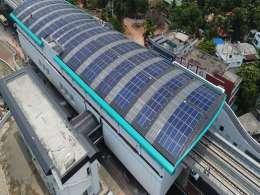French bank Societe Generale has decided to suspend its involvement as an adviser in raising finance for the city-headquartered GVK group's Hancock Coal project in Australia.
According to a statement in the official twitter account of the French bank, "delay" in executing the project is the main reason for its opting out.
"In the context of the Alpha Coal project's delay, Societe Generale has decided, in agreement with GVK-Hancock, to suspend its mandate. The bank has therefore no involvement with the project," the Paris-based lender said.
Reacting to the announcement, GVK Hancock today said, "GVK Hancock has been working with Societe Generale on a specific element of the financing arrangements for our projects, but is not currently working on that specific work package and as such does not require their services at this time.
"The key focus for our projects at this point in time is finalising our approvals and addressing litigious challenges to our attained approvals," said Josh Euler, manager, corporate affairs, GVK Hancock Coal Pty Ltd.
GVK had, in 2011, acquired 79 per cent stake in Alpha Coal and Alpha West Coal Project and 100 per cent stake in the Kevin's Corner Project, Queensland, from Hancock Coal Pty Ltd.
These projects hold estimated reserves of about 8 billion ton and a capacity of more than 80 million ton per annum.
"Once we have finalised approvals we will then execute coal off-take agreements and work to finalise financing arrangements," Euler further said.
Tim Buckley, Director of Energy Finance Studies, Australasia for the Institute for Energy Economics and Financial Analysis recently said the three Indian power and infrastructure conglomerates (Adani, GVK and Lanco Infratech) invested in Australian coal mining projects in 2011 and "each of the three project proposals have a questionable level of commercial viability and have faced a series of delays..."
All three Indian firms were already financially leveraged and yet used almost entirely debt financing for their Australian acquisitions. Since then seaborne coal price has fallen more than 50 per cent, Buckley said.





